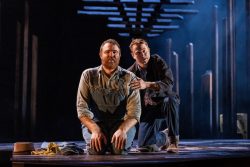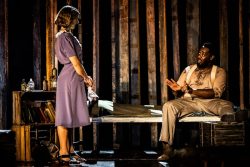 JOHN Steinbeck’s 1937 novella Of Mice and Men was drawn from the writer’s own experiences in California in the Great Depression, and paved the way for what is considered his masterpiece, the Nobel prize winning The Grapes of Wrath.
JOHN Steinbeck’s 1937 novella Of Mice and Men was drawn from the writer’s own experiences in California in the Great Depression, and paved the way for what is considered his masterpiece, the Nobel prize winning The Grapes of Wrath.
The period has been a fertile ground for literature, drama and music, and, until recently, we in the western world sat back on our laurels and thought we’d never see the like again. The painful, agonisingly regretful topicality of stories from the period has brought a new rash of productions set in the helpless confusion of those times, almost a century on.
The latest is Iqbal Khan’s vision of Of Mice and Men for Birmingham Rep and Leeds Playhouse, now reaching the end of its tour of the UK at Bath. Perhaps the most attention-grabbing element of the production is the casting of the excellent Wiliam Young, an actor with what are described as “complex learning disabilities”, which may have been similar to those depicted in Steinbeck’s gentle giant, Lennie Small. William gives a nuanced, entirely believable performance as a man unaware of his enormous strength who just loves to stroke soft things, with inexorably fatal consequences.
 He has palled up with George (Tom McCall), and together they are moving from ranch to fruit farm across the vast central Californian valley, looking for work and running from trouble. They, like so many in their economic situation at the time, live from weekly pay to brothel and bar, dreaming of a better future they know is always just out of reach. Steinbeck’s short story paints a picture of inevitable disaster when the two friends arrive at a farm where the farmer’s jealous and bullying son Curley (Riad Richie) has just married a pretty young woman. Her isolation in a male world leads her to talk to the farmhands.
He has palled up with George (Tom McCall), and together they are moving from ranch to fruit farm across the vast central Californian valley, looking for work and running from trouble. They, like so many in their economic situation at the time, live from weekly pay to brothel and bar, dreaming of a better future they know is always just out of reach. Steinbeck’s short story paints a picture of inevitable disaster when the two friends arrive at a farm where the farmer’s jealous and bullying son Curley (Riad Richie) has just married a pretty young woman. Her isolation in a male world leads her to talk to the farmhands.
Iqbal Khan takes a new look at the original, including a scene often omitted which highlights the racial element of the story, and showing Curley’s wife not as a promiscuous, risk-taking vamp but a lonely, unhappy woman.
 All these things could have led to a powerful and moving retelling of the familiar story, but this production is over-egged to the extent that the action is dragged out and the tension overwhelmed. It starts with a slave song sung to a fully lit auditorium, morphing into a different work song sung by the 11-strong ensemble. The “roof’ of Ciaran Bagnall’s set, which to some critics has signified a bunkhouse, a railroad and an arid desert, seemed at Bath like a gilt-washed decor statement in a glossy magazine. Moving it, and the bunks, around the stage was clunky. The tension was broken by the songs and some of the dialogue was inaudible. Instead of intensifying the pathos, the addition of a puppet to play ancient farmhand Candy’s old dog, was just that – the addition of puppetry.
All these things could have led to a powerful and moving retelling of the familiar story, but this production is over-egged to the extent that the action is dragged out and the tension overwhelmed. It starts with a slave song sung to a fully lit auditorium, morphing into a different work song sung by the 11-strong ensemble. The “roof’ of Ciaran Bagnall’s set, which to some critics has signified a bunkhouse, a railroad and an arid desert, seemed at Bath like a gilt-washed decor statement in a glossy magazine. Moving it, and the bunks, around the stage was clunky. The tension was broken by the songs and some of the dialogue was inaudible. Instead of intensifying the pathos, the addition of a puppet to play ancient farmhand Candy’s old dog, was just that – the addition of puppetry.
This really was a case when less would have been much more.
GP-W